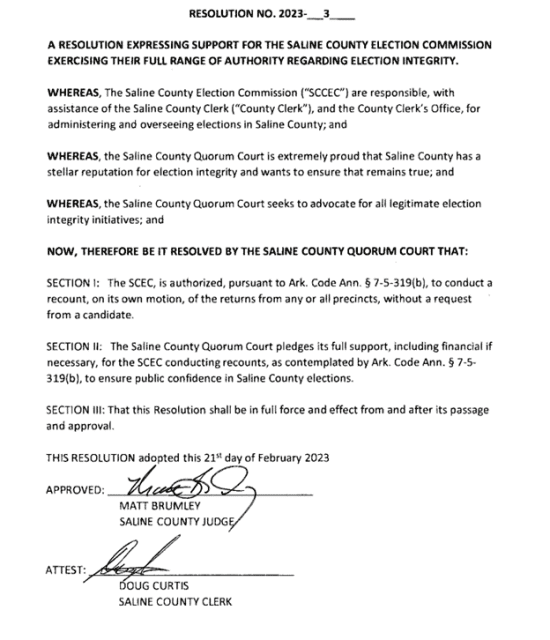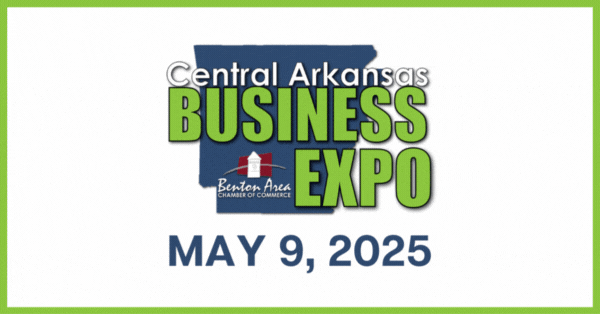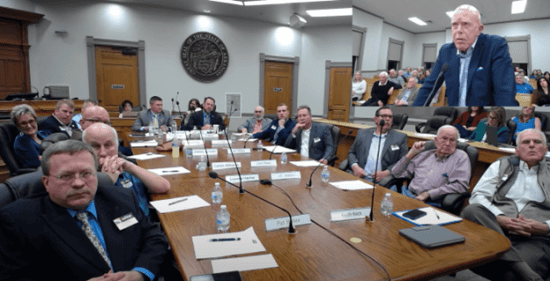by Ryan Bailey
If a time came when a portion of your fellow citizens no longer trusted their election process, how would you handle such a sensitive and important issue? That’s just what the election officials in Saline County are being tasked with.
Recently, the Cleburne County quorum court voted to remove electronic voting machines and use paper ballots instead. The Arkansas Voter Integrity Initiative Inc (AVII) is pushing to get all Arkansas counties to return to paper ballots, and members with AVII claimed to have spurred that change into action.
Now in Saline County, several citizens spoke of their distrust with the current electronic election process at the February 2023 meeting of the Saline County Quorum Court (SCQC).
At the end of the meeting, the SCQC passed a resolution to allow the Saline County Election Commission to hold a recount of upcoming elections (if it’s ever called for) on all levels: State, Local, and Federal. You may be asking, who would fund these recounts? I obtained a copy of the Resolution (posted below) and, in it, the Quorum Court pledged to pay for the recounts.

(Above) The Saline County Quorum Court passed a resolution in the February 2023 meeting stating that the County would pay for any recount of an election if one was called for.
Saline County Quorum Court met February 21st for the regular meeting. During the public comment section of the meeting, the Justices of the Peace (JPs) heard several citizens speak for and against paper ballots.
Jamie Clemmer, who is also on the Election Commission, spoke against paper ballots. “With the machines, you can’t overlook (your candidate), you can’t go with two people for one race. With paper ballots, that will happen and has happened.”
Rhonda Covington spoke for paper ballots at the 34-minute mark of the meeting’s YouTube video. “I used to trust electronic voting machines. I have no confidence in them whatsoever now. I beg you to go back to paper ballots. I am not a computer person. But I am a simple person. And I volunteer – I’ll stay up all night to go count these ballots.”
She went on to tell a story, “In the last election, there were many people who voted and they reported that the computers flipped their votes. In one instance, the voter pressed Leslie Rutledge for Lieutenant Governor but the machine selected Kelly Krout. The voter then re-selected Rutledge two more times,” Covington held up two fingers and reiterated, “two more times, and the machine finally accepted the intended selection.”
She continued, “That voter was determined, but many others do not take the time to select it over and over and over. And now after that, I will definitely check more than once. In fact, a study shows that only a small percentage of voters actually check their ballots before placing them in the tabulator. The voting computer itself is just one place where either a software glitch or nefarious activity could change votes. The tabulator level is a whole other situation and no one really knows what goes on inside those machines. Voting computers can be manipulated at the machine level, at the tabulator level or even at the vendor level. Simply having election officials check machines right before an election is the only way that you pacify voters, like me. Employees don’t have the training or expertise to know what happens inside the machine after they last check, and have no way to verify that the machine isn’t connected to the internet, making it subject to hacking or vendor level manipulation. The reality is that these voter machines are actually computers that are subject to multiple vulnerability.”
Ms. Covington’s time ran out but JP Jim Whitley asked how the voter in her story ever verified that the vote came out the way that she wanted. She replied, “I did not ask that question.”
Whitley then asked, “How would that be verified?”
Covington replied, “Well I think they felt – doing it for some time, it worked.”
“Would that be the printout?” asked Whitley.
“No, I just was told the story and I believe them,” said Covington.
“Would they not be able to verify that with the printout, that the vote finally came out correct?” Whitley asked.
“I don’t even remember when I voted, how I verified my vote.”

Photo above is a common electronic voting machine. Photo courtesy of Wired.com
Earlier in the meeting, Saline County resident and businesswoman Candy Cox spoke of her distrust in the electronic voting, “I don’t trust voting by computers. When I cast my vote, the computer prints out a receipt showing the candidates I selected along with a series of barcodes. I walk over and I put my ballot on the tabulator, and the machine doesn’t read the names, only the barcodes. I read English; I don’t read barcodes. I have no way to know whether my vote counted because I’m dependent upon the barcode.”
I spoke with Saline County Clerk Doug Curtis, who told me that “any resident is welcome to come down and take apart the machines with me and see there’s no internet interfacing devices in the machines.” He added, “This is just coming from the rumor mill. It’s just rumors. People are looking for a problem to a solution.”
Everette Hatcher, a Saline County Quorum Court member, shared similar sentiments as the Clerk when he told me: “Doug Curtis has assured me that the voting machines are not in any way controllable by any outside forces. What else can I ask for than that?” I then spoke of the other concern people pushing for paper ballots (AVII and others) have, that the voting software processing everyone’s votes is proprietary.
According to an informational page on California’s official government website, “Today, most voting system vendors treat any source code they write as confidential and proprietary. The vendors tightly control access to this source code. Election officials use the equipment, but they are normally not given access to its source code. Candidates, political parties, technical experts, and interested citizens are normally not given access to the voting system source code, either.”
The Arkansas Voter Integrity Initiative CEO Colonel Conrad Reynolds seconded this notion when he told a representative for Kait8.com “They (the voting machines) utilize proprietary software that we are not allowed to examine. This means voters cannot verify that their vote is being counted properly as mandated by state law.”
After conversations with the County Clerk, he confirmed to me that the Vote Tabulation Software is closed off to all voters. Mr. Hatcher told me he was interested in learning more, and to send him more information. Lastly, he informed me of the Saline County Quorum Court’s recent decision regarding the matter when he said “We passed a resolution calling for the election commission to do an audit on an upcoming election on our election machines. This will compare a hand count to the machine count on a local, state and federal race. I am enthusiastic about this resolution and hope it reveals if there is a problem.”
On the Saline County Republican Party meeting held on April 6, 2023, the group was able to pass a resolution, pushing for the Quorum Court to allow paper ballots. A resolution is a formal statement to show a body’s collective opinion. In this case, the body is not led by government officials, but rather they are asking government officials to pass an ordinance for elections to change to paper ballots.
Read more articles by Ryan Bailey. Ryan works in the tech field and is a freelance writer. He holds a bachelor’s degree from UA Little Rock. Ryan is a Saline County transplant and learns more about the community with each article. In his free time, you can see him hiking Pinnacle Mountain with his girlfriend, or playing video games on a rainy day.





